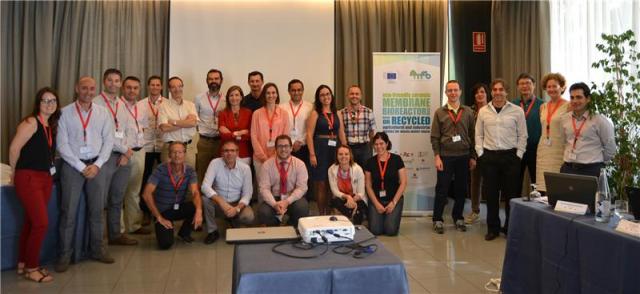Oct 9 2015
The MBR REMEB project arises from research in the field of low cost recycled ceramic membranes to develop a water treatment that combines biological treatment with membrane technology, specifically in a membrane bioreactor (MBR).
 REMEB group
REMEB group
The most innovative aspect of the project is the development and validation of a full-scale MBR with inorganic membranes made from waste ceramic and from agroindustrial processes which are currently not utilized in similar procedures. The purpose of the project, led by the company FACSA, is to respond to the social challenges linked to climate change and the environment.
As there are no references to commercial organic membranes made from waste, the project represents an interesting challenge in the field of research and technology, mainly for its economic, industrial and social impact. More specifically, REMEB MBR will reduce the manufacturing cost of the membranes (now not implemented by its high cost), and also open new doors for research in the field of water reuse. Validation of the membrane bioreactor will be held at the Water Treatment Plant in Aledo, Murcia.
The project has a budget of 2,361,622.50 euros and was financed by the European Union through the Horizon 2020 program. It is led by Sociedad de Fomento Agrícola Castellonense, SA (FACSA) and eleven partners from seven countries are involved: the Institute of Ceramic Technology Augustín Escardino of the Universitat Jaume I of Castellón; the French engineering company IMECA Process; ATLANTIS consultancy in Cyprus; the Norwegian company BIOWATER; the Council of Chambers of Commerce of Valencia; the Research Laboratory and the Environment Projects IPROMA in Castellon; the Italian Ceramic Centre CONCERBO; the Ceramics Research Centre SAM in Turkey; the Antonio Ariño University of Colombia; and the Plant of Sanitation and Wastewater Treatment of Murcia (ESAMUR).
The project approved by the European Union in February 2015 has a duration of three years (scheduled to end in August 2018), and is part of the Horizon 2020 program, which aims to boost projects and initiatives for research, technological development and innovation. The project, awarded among more than 170 proposals, focuses on "climate action, environment, resource efficiency and raw materials", issues identified, at European level, with security, climate change and production methods friendly with the environment.
The partners of this European project have kept in Benicàssim in mid-September the first coordination meeting in which was raised the work each member has to perform for developing a ceramic membrane bioreactor with ceramic and agroindustrial products for the wastewater reuse.